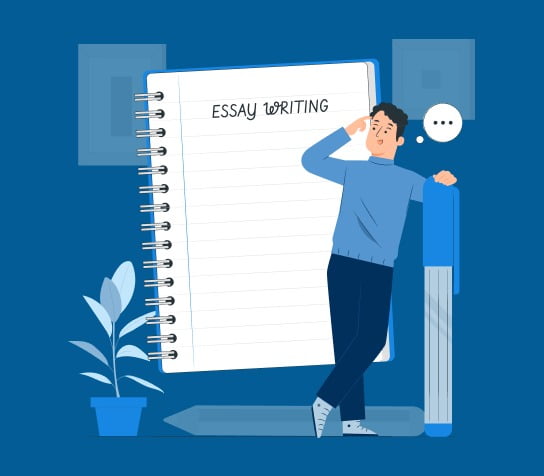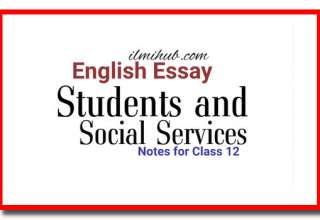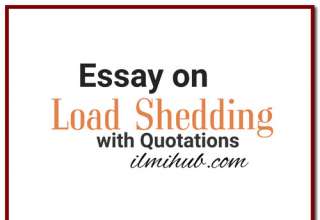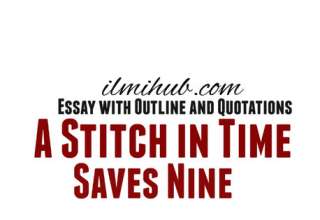
Essays are something that students at every academic level have to write. They can even be written by a writer in a non-academic capacity.
As far as the simple definition goes, an essay is a piece of content that is written for the purpose of discussing a particular topic to either provide an explanation or convince the reader of a certain point.

They can be written concisely, spanning the length of a few hundred words, or they can be long and lengthy – spreading over multiple pages.
In this post, we are going to be looking at some tips and pointers about the basics of essay writing that you should know as a writer.
Always start with making an outline
Tip number one, and that is always work with an outline.
Making an outline for your essay is easy and does not take up a lot of time. However, it can provide a lot of benefits.
- When you have an outline made, you don’t have to think about what to write in your essay when you’re actually writing it. You can get it over with right at the very beginning.
- Making an outline also helps you keep devoted to the topic that you’re writing on. When you don’t have an outline at hand, you can branch out and take the discussion somewhere else. That is not good for the essay’s quality or credibility.
- If you have to work within a certain word limit, creating an outline can also help you with that. You can, in other words, demarcate a word count to each section so that it all adds up to the requirement.
Ensure that your essay carries the right tone
As you start writing your essay, another thing that you need to ensure is that your essay is written in the right tone. Essays are academic, by and large. And as such, they have to be written like it.
Maintaining the right formal tone in your essay can help you make it look authoritative and compelling. If you can get those two things off, your essay is good to go.
Here are some actionable ways in which you can keep a formal tone in your essay:
- Don’t use slang in any way or form when writing the essay
- Don’t use colloquial terms
- Don’t use contractions. Using words like “you’ve” instead of “you have” makes the content sound conversational.
- Keep your paragraphs and sentences short. This is also a good way to convey a formal tone in your writing.
A lot of people can struggle with making their content look formal and academic. Interestingly, there is a way that essay content can be given that sort of look even if it is originally written differently.
There is an online paraphrasing tool called Paraphrase-Online. We came across it recently since we have to write a lot and everything. What’s special about this paraphrasing tool is that it has an “Academic” mode. Modes themselves aren’t a new feature in paraphrasers but the “Academic” mode is.
With this mode, you can “academic-ify” your content and give it a crisp/formal tone. We won’t talk about it a lot. You can have a look at it yourself:

Make sure your essay is properly organized and structured
A well-organized essay is a readable and likeable essay. It is also an authoritative essay – or at least, representative of the same.
When we say you should organize and structure an essay properly, we refer to doing the following things:
- Using heading styles to create headings, sub-headings, sections, and sub-sections
- Breaking down long parts of your essay into easily perusable parts, i.e., headings
- Adding bullets and lists when enumerating anything to make it easier to read
- Keeping the paragraphs and sentences short and properly spaced
Ensure grammatical perfection in your essay
This is yet another simple but important tip that you should follow when writing essays. In essays – and every other type of written content, for that matter – grammatical perfection is a mark of high quality. When there are no errors in the text, it shows that the writer has put effort into writing it and checking it carefully.
The opposite is the impression that the content happens to be riddled with grammar mistakes.
There are a few different things that you can do to ensure that your essay comes out perfect in terms of grammar (and spelling, too, while we’re at it).
- The first thing you have to do – which is something a lot of writers can be somewhat oblivious of – is to be very careful and deliberate when you’re writing out the draft for the first time. A lot of writers can aim to be as quick as they can, and in the process, they can end up making a lot of errors. 50 words written per minute carefully are better than 100 written hastily. You’ll just even out the time saved by spending it in proofreading and correcting.
- Of course, even if you are careful, mistakes can still be made. That is why you have to proofread the essay once you are done writing it. You should read the text and look for any errors that you may have made. For proofreading itself, there are a number of different tips and pointers that we can suggest, such as:
- When you’re done with the essay, don’t start reading it right away. That way, you won’t be able to find a lot of mistakes. Your mind will remember all that you’ve written, and it will fly over the words and sentences without taking it all in. That is why it’s a good idea to pause for at least an hour before you start the proofreading. Of course, if you are in an exam or if you just don’t have the time, you could shrink it down to 20 minutes, etc.
- When reading the essay, do it a couple of times. And each time, look for a specific type of error. Errors become easier to spot when you’re looking for specific ones at a time. You could, for instance, look for incorrect uses of commas the first time you read it. Then, you could look for things like spacing and capitalization issues.
And that is pretty much it.
Conclusion
And that wraps it up.
There is a lot more to writing essays and writing them well. The tips mentioned above are comprehensive and helpful since they can be applied to every essay and not just a certain type. You can use them for long essays or short ones – narrative essays or descriptive ones.
We hope you enjoyed reading the content above and we hope that you can put those tips to good use the next time you have to write an essay.





